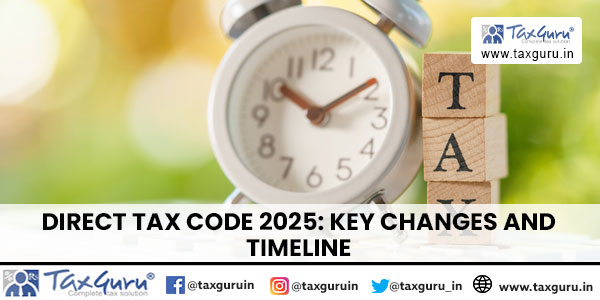The Direct Tax Code (DTC) aims to replace the outdated Income Tax Act of 1961 with a more streamlined and modern tax system. The DTC’s journey began in 2009 with the release of a draft, followed by the introduction of the bill in 2010. After multiple revisions, the DTC bill is expected to be introduced in 2025. One of its primary objectives is to simplify the tax structure, reduce the burden on the middle class, and improve tax compliance. Notably, the DTC eliminates exemptions and deductions, consolidating income into two broad categories: “Income from Employment” and “Income from Residuary Sources.” It also introduces uniform tax rates for both domestic and foreign companies, aiming to attract more foreign investment. Furthermore, TDS and TCS will be applied more broadly to reduce tax evasion. Key differences include the taxation of LIC maturity proceeds, the removal of special tax rates on capital gains, and the replacement of three residential statuses with two. The DTC also revises the concept of the assessment year and proposes a simplified tax regime for easier understanding. The introduction of the DTC is expected to improve tax filing compliance, promote equity, and modernize the tax system in India.

1. History:
In India if you want to pass any law and that law should be treated as law of land you must have to pass the law from both the house of parliament i.e. Rajya Sabha and Lok Sabha. In case of GST, the bill was introduced in parliament which was passed by Rajya Sabha as on 3rd August 2016 and Lok Sabha as on 8th August 2016 respectively. GST involve State related taxes also and it was first time discussed around 2000 but finalized and implemented in 2017. It tooks almost 17 years to implement GST in India. Government had a plan to implement Direct Tax Code bill after two years from the date of implementation of GST.
Same as GST, A Draft code along with concept paper was released on 12th August 2009. After receiving suggestion from various stakeholders revised discussion paper was relised on 15th June 2010. There after By Mr. P.Chidambaram (FM in UPA Goverment) The Direct Tax Code Bill 2010 was introduced in lok sabha as on 30th August 2010.
The Bill was referred to the Standing Committee on Finance (SCF) on 9th September, 2010 for examination and report thereon. The SCF presented its report to the Speaker, Lok Sabha in March, 2012.
Further, the Kelkar Committee in its report on ‘Road Map for fiscal consolidation’ submitted to the Government in September, 2012.
Why it’s always so delay?
The change in law always effect politics as we can see that in USA election Kamla Harris Plan to charge Capital gain Tax @ 25% on unrealized profit and 44% on realized profit in result we all know what happened in USA elections. So that’s the reason for delay it will impact political parties result also.
Now, We have already made lots of changes in Income Tax Act 1961 related to Direct Tax Code 2025 like Face Less Assessment,TDS on Purchase of Goods and TCS on sale of Goods , these are all example of Direct tax Code.
Since Income Tax Act 1961 is very old and its very high time for New Law as compare to make an amendment in existing Law, that’s the reason our Current FM Shri Nirmla Sitaram Ji from BJP Announced that in Next 6 Month they will replace our Existing Income tax act 1961 with Direct Tax Code 2025 i.e. in Finance Budget 2025.
2. Time Line of Direct Tax Code
2009: The First Draft of the DTC was propose to replace the I.tax Act
2010: DTC Bill 2010 was introduced in Lok Sabha By Mr. P.Chidambaram (FM in UPA Goverment).
2013: DTC incorporating the suggestions from stakeholders
2017: A Six member task force setup to draft new Direct Tax Law.
2024: The Announcement of the DTC imminent introduced by FM Nirmala Sitharaman.
2025: Coming up DTC with Budget 2025.
3.About Direct Tax Code with Comparison with Income Tax Act
(a) In Income Tax Act 1961 only CA can audit the Books of Account but in Direct tax code 2025, there is a possibility that CMA and CS also can audit the books of account.
(b) In Income Tax Act 1961 total No. of section is 298 & 14 Schedule, 23 Chapters and many more sub section, clauses and sub clauses But in Direct Tax Code there is only 319 Sections and 22 schedule.
(c) In Income Tax Act LIC maturity is exempt but in Direct tax Code it is taxable @5%.
4.Objective for Change of Income Tax
Tax Structure to be simplified: Existing Income Tax Act 1961 is very old. It is inefficient in modern era in lots of term. It is very complex for a normal person it is very difficult to understand.
Reduced the burden of Tax: As per Government in existing Income Tax Act 1961, the middle class person bears the highest tax burden. So by direct tax law govt. wants to reduce the burden of tax on middle class. As per govt. recodes right now only 1.2% persons pay the taxes if DTC is come into effect it will increase to around 7% and in result middle class tax burdens also reduced.
5. No Exemptions and No Deductions
Understanding the current Income Tax Act 1961 is very complex due to lots of exemptions and deduction. As against, In direct tax code there will no exemptions and deductions. In income tax act 1961 the option for new regime is also reflecting the picture of direct tax code.
6. Residential Status
Earlier in income tax act there was three residential status i.e. resident and ordinary resident, resident nut not ordinary resident and non-resident. But in direct tax code 2025 there will only two category i.e. resident and non-resident only.
7. Concept of Year
In Income tax act 1961 there is a concept of assessment and previous year, lots of time it increase the confusion between a non-professional persons and in Direct tax code 2025 there will not any concept related to assessment year and previous year there will be simple concept financial year only.
8. Heads of Income
In Income tax act 1961, if you earned income from salary than you mentioned “Under Income From salary” and if You have any other Income like Bank Interest or Dividend then you mentioned under “Income From other Sources” but in Direct Tax Code you will mention as “ Income From Employment and “Income from Residuary Sources” respectively.
9. TDS or TCS Collection
In Direct Tax Code there will be a provision to deduct the TDS or Collect the TCS at the time source of generation. In DTC they include large nature of transaction in TDS or TCS. The result of these provision will be increase the number of fillers of Income Tax Return and tax evasion is also reduce.
10. Tax Rate
(a) In Direct tax Code 2025, there will be a probability that higher rate of tax is 35% as against in income tax i.e. 30% but due to surcharge that effective rate became 42.744%. Surcharge may be removed in direct tax code 2025.
(b) Income Tax Act there is different rate of tax in case of foreign companies and for domestic company we have different rate of tax but in Direct Tax act 2025 the rate of tax is same for both companies so we can invite more foreign investments.
11. No Special Rate of Tax
In existing income tax act there was a separate rate of tax in case of transfer of capital asset i.e. called capital gain tax but in Direct Tax code 2025 there will be no concept for special tax rate so gain on transfer from capital asset shall be treated as a part of normal income.
12. Income of Political Parties
There will not be any proposed change in Direct Tax Code 2025 in terms of income of political party. Same as income act 1961, the income earned by any political party still exempt from any tax.
*****
The author can be however contacted for further clarification at 9654182791 or via mail at caajay92@gmail.com
DISCLAIMER:- This Blog is for the purposes of information / knowledge and shall not be treated as solicitation in any manner or of for any other purposes whatsoever.






This article provides a comprehensive summary of all the information available to date, presenting it in a clear and well-organized manner.